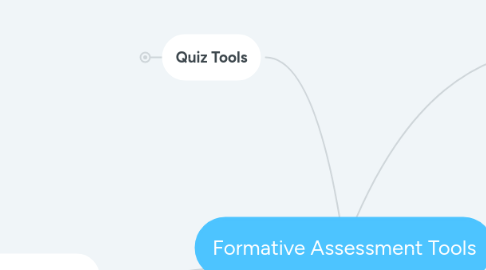Formative Assessment Tools
by Tabitha Clabaugh

1. Quiz Tools
1.1. Kahoot- Kahoot is an online quiz site that allows teachers to create quizzes, or use already made quizzes. The quiz questions are displayed on the smart board, and the students use a tablet, computer, or smartphone to choose their answers.
1.2. Quizizz- Quizizz is an online quiz site that allows teachers to create quizzes, or use already made quizzes. Teachers can duplicate quizzes and add questions from other quizzes, or add their own questions.
1.3. Google Forms- Google forms allow teachers to create quizzes, worksheets, and assessments for their students to take. The questions can be multiple choice, short answer, checkbox, dropdown, or paragraph. This allows the teacher to create quizzes with a variety of answer tools.
1.4. IXL-IXL is a website that students can use to take quizzes over the standards. If students answer something incorrectly they are given feedback and an explanation. The website collects data that lets teachers know what students are struggling with and their growth.
1.5. Quizlet-Quizlet is an online quiz website that allows teachers to create flashcards for students to practice and study with.
1.6. Socrative-Socrative is a website that allows teachers to create quizzes that can be turned into games.
1.7. Formative-Formative is a website that allows teachers to create quizzes and assignments for students. These assignments and quizzes can be linked to google classroom.
2. Limited Technology
2.1. Plickers- Plickers are printed cards students use to answer questions. The teacher uses a tablet or smartphone to scan the card to quickly check the student's answers.
2.2. QuickKey-QuickKey is a grading application for teachers. Students take an assessment on paper, and teachers can scan the quizzes with their smartphone for quick and easy grading.
2.3. ZipGrade-ZipGrade is a website that allows teachers to create quizzes and answer keys. These can be printed off so that students can take the quizzes on paper. The teacher can scan the answer sheet and the website grades the quizzes.
2.4. GradeCam- GradeCam allows teachers to create quizzes and answer sheets that they can print off and give to students. The teachers can use smartphones to scan the answer sheets for quick results.
3. Polling Tools
3.1. Mentimeter-Mentimeter is a website that allows teachers to create interactive presentations. Students can use smartphones or tablets to vote during the presentation.
3.2. PollDaddy-PollDaddy is a website that allows teachers to create polls, quizzes, and surveys. Students can use smartphones or tablets to answer.
3.3. Poll Everywhere- Poll Everywhere allows teachers to create questions using multiple poll types such as multiple choice, or word clouds.
4. Reading Tools
4.1. Raz-Kids- Raz-Kids is a website that allows students to read ebooks online. Students can take quizzes over the books to check for comprehension. Students can also record themselves reading the books. This allows the teacher to monitor student fluency.
4.2. Readtheory- Readtheory is a website that allows students to read passages and answer questions over them. Data is collected that gives a student's lexile reading level, as well as information about what concepts students know and are struggling with.
4.3. QuickVoice Recorder- QuickVoice Recorder is an application for ipads or iphones that allow students to record themselves. Teachers can use this application to monitor student fluency.
5. Brainstorming Tools
5.1. XMind- XMind is a mindmapping website that allows students to create a digital mindmap. Students can choose from different templates to start their mindmap, as well as collaborate on mindmaps.
5.2. Padlet- Padlet is an online poster board that allows students to brainstorm and collaborate.
5.3. Mindmeister-Mindmeister is a mindmapping website that allows students to brainstorm.
5.4. Coggle-Coggle is a website that allows students to create mindmaps and collaborate with students.


